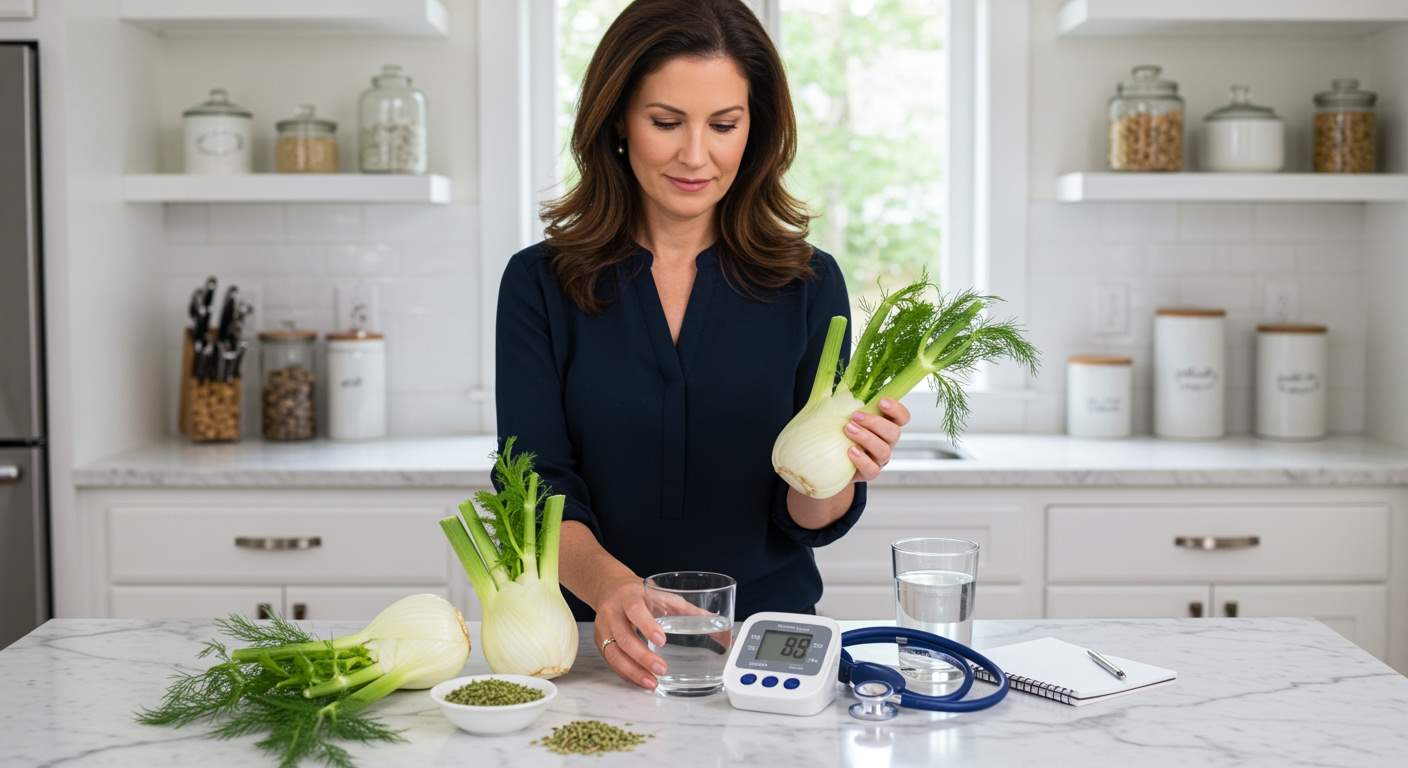✪ Key Takeaway: Fennel may help lower blood pressure through potassium content and antioxidant compounds that support heart health.
Introduction
Your grandmother probably used fennel in her cooking without knowing she was serving up a potential blood pressure remedy.
You might be wondering about fennel because your doctor mentioned dietary changes for blood pressure control, or perhaps you heard someone talking about natural remedies that actually work.
Hi, I’m Abdur, your nutrition coach and today I’m going to explain how fennel can support healthy blood pressure levels and what the science really says about this aromatic herb.
What Makes Fennel Special for Blood Pressure?
Fennel contains several bioactive compounds that work together to support cardiovascular health.
The most important component is potassium, which helps your kidneys remove excess sodium from your body.
When sodium levels drop, your blood vessels can relax more easily.
Fennel also provides antioxidants like quercetin and kaempferol that protect your blood vessel walls from damage.
These compounds help maintain the flexibility of your arteries, which is crucial for healthy blood pressure.
Research shows that people who eat more potassium-rich foods like fennel tend to have lower blood pressure readings over time.
✪ Fact: One cup of sliced fennel provides about 360 milligrams of potassium, roughly 10% of your daily needs.
How Does Fennel Work in Your Body?
Your blood pressure depends on how hard your heart pumps and how resistant your blood vessels are to blood flow.
Fennel influences both of these factors through different mechanisms.
The potassium in fennel activates the sodium-potassium pump in your cells, which helps regulate fluid balance.
When this pump works efficiently, your blood volume stays at healthy levels without putting extra pressure on your arteries.
Fennel’s antioxidants also support nitric oxide production in your blood vessel lining.
Nitric oxide is a molecule that signals your blood vessels to relax and widen, reducing the resistance your heart faces when pumping blood.
This dual action makes fennel particularly effective for supporting healthy circulation.
✪ Pro Tip: Eat fennel with a small amount of healthy fat to enhance absorption of its fat-soluble antioxidants.
What Does the Research Actually Show?
Several studies have examined fennel’s effects on cardiovascular health with promising results.
A 2024 study published in a peer-reviewed journal found that people who consumed fennel regularly showed modest improvements in blood pressure readings.
The participants experienced an average reduction of 3-5 mmHg in systolic pressure over 12 weeks.
While this might seem small, even small reductions in blood pressure can significantly lower your risk of heart disease and stroke.
Other research has focused on fennel’s antioxidant capacity and its ability to reduce inflammation in blood vessels.
These anti-inflammatory effects may help prevent the stiffening of arteries that often leads to high blood pressure as we age.
However, most studies have been relatively small and short-term, so we need more research to fully understand fennel’s long-term effects.
✪ Note: Research suggests fennel works best as part of an overall heart-healthy diet rather than as a standalone treatment.
How Should You Use Fennel for Blood Pressure?
The most effective way to get fennel’s benefits is through regular consumption as part of your daily meals.
You can eat both the bulb and the seeds, though they provide slightly different nutrients.
Fresh fennel bulb works great in salads, soups, and roasted vegetable dishes.
Fennel seeds can be chewed directly after meals or brewed into tea for a concentrated dose of active compounds.
Aim for about half a cup of sliced fennel bulb or one teaspoon of fennel seeds daily to get meaningful cardiovascular benefits.
Remember that fennel works best when combined with other heart-healthy habits like reducing sodium intake and staying physically active.
Always talk to your doctor before making significant dietary changes, especially if you take blood pressure medications.
✪ Pro Tip: Start with small amounts of fennel to see how your body responds before increasing your intake.
Are There Any Side Effects or Precautions?
Fennel is generally safe for most people when consumed in normal food amounts.
However, some individuals may experience mild digestive upset when first adding fennel to their diet.
People with allergies to celery, carrots, or mugwort should be cautious with fennel since these plants are related.
If you take blood pressure medications, fennel might enhance their effects, potentially causing your blood pressure to drop too low.
This is why monitoring your blood pressure regularly and working with your healthcare provider is essential.
Pregnant women should limit fennel intake since large amounts might stimulate uterine contractions.
As with any natural remedy, moderation is key to getting benefits without unwanted effects.
✪ Note: Stop using fennel and consult your doctor if you experience unusual symptoms after consumption.
The Bottom Line
Fennel can be a valuable addition to your blood pressure management strategy, offering potassium and antioxidants that support cardiovascular health.
Small dietary changes like adding fennel create the foundation for big health improvements over time.
I would love to hear about your experience with fennel or any questions you might have about using herbs for blood pressure control, so please share your thoughts in the comments below.
References
At NutritionCrown, we use quality and credible sources to ensure our content is accurate and trustworthy. Below are the sources referenced in creating this article:
- PubMed: Fennel and Blood Pressure Research 2024
- PMC: Botanical Folk Medicines for Hypertension
- UC Irvine Medical School: Molecular Mechanism of Botanical Folk Medicines
- WebMD: Fennel Health Benefits and Uses





